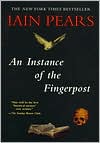An Instance of the Fingerpost
by Iain Pears
Sunday, October 12, 2003

The opinions I’ve come across on this book are divided pretty evenly between ‘couldn’t read it’ and ‘absolutely loved it’ - no one seems to end up on the middle ground. I thought the lack of averageness was as good a reason to read it as any, and besides, it sounded fascinatingly different from the mysteries I generally devour.
The story is divided into four separate narratives; each detailing some of the same events from another point of view, each adding to and changing the reader’s idea of what has happened. The scene is mostly Oxford in 1663, after the English Civil War and before the Bubonic Plague and the Great Fire of London enter the history books. Many of the characters are real people, some of them I recognised, many of them I didn’t know, there’s a note at the end that points out the real from the fictional.
I wasn’t totally compelled by the book, there were certainly parts of the second and third stories where I could have left the book for a while, but I couldn’t put it down for too long. Darren assured me that Pears knew how to end a book and this added to my feeling that this was a book worth the effort of reading. At close on seven hundred pages, all written somewhat in seventeenth century style, it’s quite a weighty read. The narratives that begin and end the story are easier reads than the two in between though and towards the end when all the pieces of the puzzle begin to fall into their places it’s quite magical.
So I’m definitely camped out with the people who think this is an excellent book. One of the things that worried me when I was reading was that some of the small details would turn out to be essential to the plot and that my enjoyment would be marred by forgetting something that seemed minor, that while the four narratives built on top of each other I’d miss a difference between them that would ruin the book for me in the end. To future readers I’d just like to say that that won’t be the case. Like any whodunnit the clues are clear enough when the author wants to make them seen, sit back and enjoy the story and let the author do his work.









